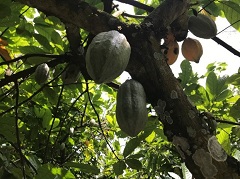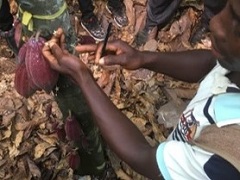- Home
- News & Features
- Press Releases
- FY2019
- Signing of Loan Agreement for “Cocoa Value Chain Enhancement Project” in Ghana: Contributing to Enhancement of the Agricultural Value Chain and Related Industries
Press Releases
![]()
![]()
![]()
February 21, 2020
Signing of Loan Agreement for “Cocoa Value Chain Enhancement Project” in Ghana: Contributing to Enhancement of the Agricultural Value Chain and Related Industries
 Cocoa beans
Cocoa beans Pollination work for cocoa bean cultivation
Pollination work for cocoa bean cultivation
On Feb 14 2020, the Japan International Cooperation Agency (JICA) signed a loan agreement with the Republic of Ghana’s Ghana Cocoa Board (COCOBOD) for financing of Productivity Enhancement Programs (PEPs; Note 1). This loan agreement will provide $600 million in co-financing by development finance institutions (DFIs) and private finance institutions, with the DFIs—JICA, the African Development Bank (AfDB), the Development Bank of South Africa (DBSA), and the Italian National Promotion Bank “Cassa Depositi e Prestiti” (CDP)—providing $250 million ($100 million by JICA), and private financial institutions providing $350 million.
As announced at the 7th Tokyo International Conference on African Development (TICAD7) in 2019, JICA and the AfDB agreed to provide $3.5 billion in joint financing under the fourth phase of the Enhanced Private Sector Assistance for Africa initiative (EPSA 4; Note 2). This loan marks the first time JICA will be providing direct co-financing with AfDB under EPSA4.
As the world’s second largest cocoa bean producer, Ghana fulfills a major part of related demand around the world. However, there are problems with productivity of the country’s cocoa bean farms, as well as with the systems in place for processing and distribution of cocoa. The government of Ghana has a concrete plan for ameliorating these problems. The Ghanaian government established COCOBOD to manage production and distribution of cocoa. COCOBOD will buy cocoa beans from farmers and verify their quality before they are exported. JICA is cooperating with COCOBOD to enhance cocoa bean inspection management capability through a technical cooperation project and seminars, helping to stabilize Ghana’s cocoa bean exports.
By strengthening the cocoa bean-centric agricultural value chain and related industries, they will also contribute to achieving U.N. sustainable development goals 1 (no poverty), 8 (decent work and economic growth) and 12 (responsible consumption and production).
Aiming to prioritize respect for individual human security, JICA has been conducting on-going discussions with the government of Ghana and NGOs regarding use of child labor by Ghana’s cocoa industry. As a result, we have established a common goal of achieving a cocoa industry that is socially, economically and environmentally sustainable, including the abolishment of child labor. In order to provide a setting for working together to achieve that goal, in January 2020 we established the “Platform for Sustainable Cocoa in Developing Countries.” By applying the technology, know-how and finances of parties involved, we aim to eliminate human rights issues from the cocoa value chain.
(Note 1) The objective is to increase Ghana's cocoa bean production by replanting trees, improving irrigation facilities, developing the warehouses and databases required for smooth distribution and providing working capital to Ghana's cocoa bean processing companies.
(Note 2) The African Development Bank and JICA will jointly provide $350 million in financing over the next three years (2020-2022) to support development of Africa’s private sector.
- About JICA
- News & Features
- Countries & Regions
- Our Work
- Thematic Issues
- Types of Assistance
- Partnerships with Other Development Partners
- Climate Change / Environmental and Social Considerations
- Evaluations
- Compliance and Anti-corruption
- Science and Technology Cooperation on Global Issues
- Research
- JICA Development Studies Program / JICA Chair
- Support for the Acceptance of Foreign HRs / Multicultural and Inclusive Community
- Publications
- Investor Relations





